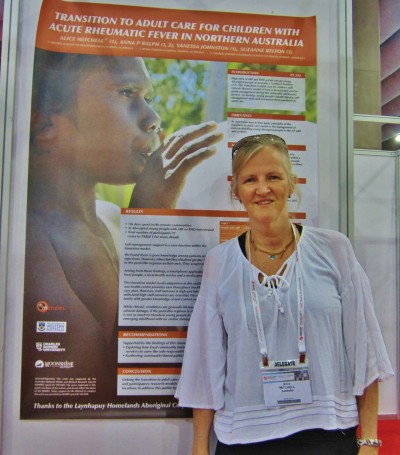“That Heart Sickness”
How (mis)communication in the health system is impacting people living with rheumatic heart disease
 “One of the things I found in my research was that people were calling acute rheumatic fever and rheumatic heart disease, ‘rheumatic heart fever’ or ‘that heart sickness’. It all gets glossed into one term. What’s missing is all the critical information around the length of time people are on injections, what the injections are for, what happens if you miss an injection, the serious nature of the disease. That sort of knowledge just isn’t there”, said Menzies PhD candidate Alice Mitchell.
“One of the things I found in my research was that people were calling acute rheumatic fever and rheumatic heart disease, ‘rheumatic heart fever’ or ‘that heart sickness’. It all gets glossed into one term. What’s missing is all the critical information around the length of time people are on injections, what the injections are for, what happens if you miss an injection, the serious nature of the disease. That sort of knowledge just isn’t there”, said Menzies PhD candidate Alice Mitchell.
Alice’s thesis entitled, That Heart Sickness: Exploring Young Aboriginal People's Experiences of Rheumatic Fever Care from Childhood to Adulthood has confirmed the longstanding view held by many experts that there’s a disconnect between the biomedical language and world view of the west and that of Indigenous Australians, and that this disconnect leads to confusion, misinterpretation and even harm.
“Aboriginal people have a sense of not being told the full story. It’s not a deliberate action by health care workers, it’s just what happens when biomedical English terms are used to converse with Aboriginal people whose first language isn’t English”
Alice’s research is helping shape Indigenous health care by focussing on a bottom up approach that recognises the importance of language and worldview and centres health care around the individual.
“I know from previous research I was involved in in the Northern Territory that intercultural communication in the context of Indigenous health care has shown communication is not a simple two way street of talking and listening. There are many factors that can make intercultural communication between Yolŋu (Indigenous people from Northeast Arnhemland) and Balanda (non-Indigenous people) difficult and the results from (mis)communication can often have detrimental effects to Indigenous patients’ health”, Alice said.
This is a story that is not uncommon. The AMOSS Study on RHD in Pregnancy also found Indigenous women with RHD in pregnancy did not fully understand their condition. As a result, the women experienced fragmented care, disjoined care results, delayed diagnosis, poor adherence to medications and a range of other issues. The results of the qualitative research were recently published in The Australian & New Zealand journal of obstetrics & gynaecology.
Lead author, Associate Professor Suzanne Belton, said, “I had one mother tell me, ‘my daughter came to me and said because I have RHD, you probably won’t have any grandchildren.’ "
“I just found that really sad. Here was this teenage girl with RHD who thought she’d never be able to have a family. She assumed her heart was too damaged but often that is not the case as many women can and do go on to have healthy babies.”
So, how do we overcome these barriers?
Alice doesn’t believe that there are any shortcuts. “We need to start by communicating with Aboriginal people in a way that makes sense to them, incorporating communication methods they use with the western biomedical way of thinking. For instance, there are three questions that Aboriginal people always have concerning ill health; where does it live, what does it look like and how does it behave. Now we have a starting point from which to build a conversation about health.”
Alice Mitchell has lived in the NT for 35 years working as a nurse, midwife, and educator. She has a Master’s degree in Applied Linguistics where she researched health literacy in the NT and is in the throes' of completing a PhD in Public Health.
Associate Professor Suzanne Belton is a medical anthropologist, midwife and the Regional Partnerships Manager at NTPHN.
What is ARF/RHD
The most important thing to know about RHD is that it’s 100% preventable. It is a disease that proliferates in areas of poverty and disadvantage. It’s a disease that starts from undiagnosed and/or untreated streptococcal infection. It usually displays as a skin or throat infection (‘Strep Throat’) and progressing in a matter of weeks to ARF, which can then damage the heart valves. The damage to the valves is known as RHD. Research suggests that a majority of patients follow a traditional disease progression that looks like this; Group A strep infection -> ARF -> RHD.
RHDAustralia is committed to working with Indigenous communities, liaising with local Indigenous health professionals and peak bodies to ensure information is delivered and developed in a meaningful, culturally appropriate way. The evidence is clear that there is an urgent need for resources to be developed by and for Indigenous people and in their language.
For more information about ARF and RHD, please visit our website.
